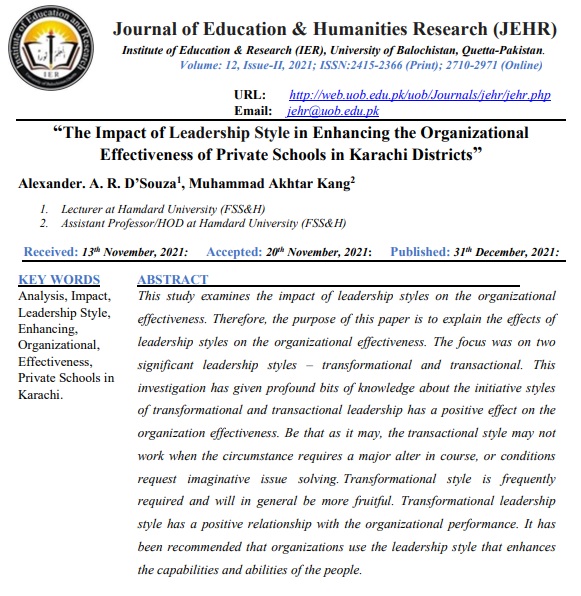The Impact of Leadership Style in Enhancing the Organizational Effectiveness of Private Schools in Karachi Districts
Keywords:
Analysis, Impact, Leadership Style, Enhancing, Organizational, Effectiveness, Private Schools in Karachi.Abstract
This study examines the impact of leadership styles on the organizational effectiveness. Therefore, the purpose of this paper is to explain the effects of leadership styles on the organizational effectiveness.
The focus was on two significant leadership styles – transformational and transactional. This investigation has given profound bits of knowledge about the initiative styles of transformational and transactional leadership has a positive effect on the organization effectiveness. Be that as it may, the transactional style may not work when the circumstance requires a major alter in course, or conditions request imaginative issue solving. Transformational style is frequently required and will in general be more fruitful.
Transformational leadership style has a positive relationship with the organizational performance. It has been recommended that organizations use the leadership style that enhances the capabilities and abilities of the people.
References
Bass, B. M., & Avolio, B. J. (Eds.). (1994). Improving organizational effectiveness through transformational leadership. Sage.
Bass, B. M. (1985). Leadership and performance beyond expectation. New York: Free Press.
Bass, B. M., & Riggio. (2006). Transformational Leadership. (2nd. Ed), Mahwah, NJ: Lawrence Erlbaum Associates.
Burns, J.M. (1978). Leadership. New York: Harper & Row.
Drucker, P. F. (2007). Management. Tasks, responsibilities, practices. New Brunswick.
Dvir, T., Kass, N., & Shamir, B. (2004). The emotional bond: Vision and organizational commitment among high-tech employees. Journal of organizational change Management, 17(2), 126-143).
Gavrea, C., Ilies, L. & Stegerean, R., (2011). Determinants of organizational performance: The case of Romania. Management & Marketing, 6(2), pp. 285-300.
Harris, A. et al., (2007). Distributed leadership and organizational change: Reviewing the evidence. Journal of Educational Change, 8(4), pp. 337-347.
Jyoti, J. & Bhau, S., (2015). Impact of transformational leadership on job performance: Mediating role of leader– member exchange and relational identification. SAGE Open, 5(4), pp.1-13.
Kouzes, J. M., & Posner, B. Z. (2007). The Leadership Challenge: How to get extraordinary things done in organizations (4th.ed.). San Francisco: Jossey-Bass.
Longe, O. J., (2014). Leadership style paradigm shift and organizational performance: A case of the Nigerian Cement Industry. African Research Review, 8(4), pp. 68-83.
Mitonga-Monga, J. & Coetzee, M., (2012). Perceived leadership style and employee participation. African Journal of Business Management, 6(15).
Ojokuku, R. M., Odetayo, T. A. & Sajuyigbe, A. S., (2012). Impact of leadership style on organizational performance: a case study of Nigerian banks. American Journal of Business and Management, 1(4), pp. 202-207.
Sila, I., & Ebrahimpour, M. (2005). Critical linkages among TQM factors and business results. International Journal of Operations & Production Management. 25 (11), 1123-1154.
Stein, L. (2016). Schools need leaders—Not managers: It’s time for a paradigm shift. Journal of Leadership Education, 15, 21–30. doi:1012806/V15/I2/I.
Sofi, M. A. & Devanadhen, D. K., (2015). Impact of Leadership Styles on Organizational Performance: An Empirical Assessment of Banking Sector in Jammu and Kashmir. IOSR Journal of Business and Management, 17(8), pp. 31-45.
Uchenwamgbe, B.-B. P., (2013). Effects of Leadership Style on Organizational Performance in Small and Medium Scale Enterprises (SMEs) in Nigeria. European Journal of Business and Management, 5(23), pp. 53-73.
Vigoda-Gadot, E., (2012). Leadership style, organizational politics, and employees' performance: An empirical examination of two competing models. American Journal of Business and Management, 36(5), pp. 661- 683.
Xu, G. Y. & Wang, Z. S., (2008). The impact of transformational leadership style on organizational performance: The intermediary effects of leader-member exchange. Long Beach, CA, USA, IEEE Xplore, pp. 1090-1097.
Yukl, G. (2009). Leadership and Organizational Learning: An evaluative essay. Leadership Quarterly, 20, 49-53.




